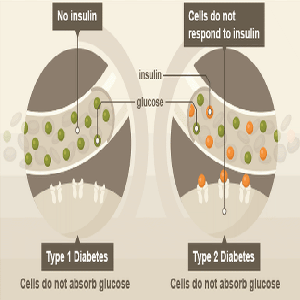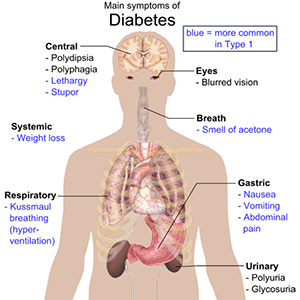 Diabetes is a disease caused by either the body's inability to make insulin (Type 1) or by the body not responding to the action of insulin (Type 2 ) It can also occur during pregnancy. Insulin (produced by the pancreas) is one of the main hormones that regulates blood sugar level and allows the body to use sugar (glucose) for energy.
Diabetes is a disease caused by either the body's inability to make insulin (Type 1) or by the body not responding to the action of insulin (Type 2 ) It can also occur during pregnancy. Insulin (produced by the pancreas) is one of the main hormones that regulates blood sugar level and allows the body to use sugar (glucose) for energy.
Type 1 Diabetes
Type 1 diabetes occurs because the insulin-producing cells of the pancreas (called beta cells) are destroyed by the immune system. People with type 1 diabetes produce no insulin and are dependent on insulin lifelong. Type 1 diabetes most commonly starts in people under the age of 20.
Type 2 Diabetes
In type 2 diabetes the pancreas produces either not enough insulin, or the body is unable to recognize insulin and use it properly. The body continues to produce insulin, but this production may significantly decrease over time. When there isn't enough insulin or the insulin is not used as it should be, glucose can't get into the body's cells to be used as energy. This glucose then builds up in the blood causing high sugars.
Gestational Diabetes
Hormone changes during pregnancy can affect insulin's ability to work properly. This condition is as called gestational diabetes & occurs in about 4% of all pregnancies. Pregnant women who have an increased risk of developing gestational diabetes are those who are over 25 years old, are above their normal body weight before pregnancy, have a family history of diabetes, or are Hispanic, black, Native American, or Asian.
Screening for gestational diabetes is performed during pregnancy. Left untreated, gestational diabetes increases the risk of complications to both the mother and her unborn child.
Usually, blood sugar levels return to normal within six weeks of childbirth. However, women who have had gestational diabetes have an increased risk of developing Type 2 diabetes later in life.
What Are the Symptoms of Diabetes?
 The symptoms of Type 1 diabetes often occur suddenly and can be severe. They include:
The symptoms of Type 1 diabetes often occur suddenly and can be severe. They include:
- Increased thirst
- Increased hunger (especially after eating)
- Dry mouth
- Frequent urination
- Unexplained weight loss (even though you are eating and feel hungry)
- Fatigue (weak, tired feeling)
- Blurred vision
- Weight loss
The symptoms of Type 2 diabetes often go unnoticed. These symptoms build up over time and include:
- Blurred vision
- Increased thirst
- Dry mouth
- Slow healing sores or cuts
- Itchy skin (usually in the vaginal or groin area)
- Yeast infections
- A need to urinate often
NOTE -* Symptoms of Diabetes may often go unnoticed among individuals. This is one of the major factors for patients to land up into complications even before they realize its severity. Thus knowing ones risk factor is an important and easy way to avoid health hazards.
What increases your risk to develop Diabetes?
The following factors may increase your chance of getting diabetes:
- Family history of diabetes
- African-American, Hispanic, Native American or Asian-American race or ethnic background
- Being overweight
- Age (Chances increase with age)
- Taking certain medicines
- Stress induced
- A need to urinate often
- Sedentary lifestyle
- Being pregnant*
*Pregnancy puts extra stress on a woman's body that causes some women to develop diabetes. Blood sugar levels often return to normal after childbirth. Yet, women who get diabetes during pregnancy have an increased chance of developing diabetes later in life.
What are the symptoms of low blood sugar?
Most people have symptoms of low blood sugar (hypoglycemia) when their blood sugar is less than 70 mg/dl. When your blood sugar is low, your body gives out signs that you need food. Different people have different symptoms. You will learn to know your symptoms.
Common low blood sugar symptoms include the following:
Early symptoms You may:
- Feel weak
- Feel dizzy
- Feel hungry
- Tremble
- Feel shaky
- Sweat
- Have a pounding heart
- Feel frightened or anxious
Late symptoms You may:
- Feel confused
- Have a headache
- Have poor coordination
- Be unable keep your mind on one subject